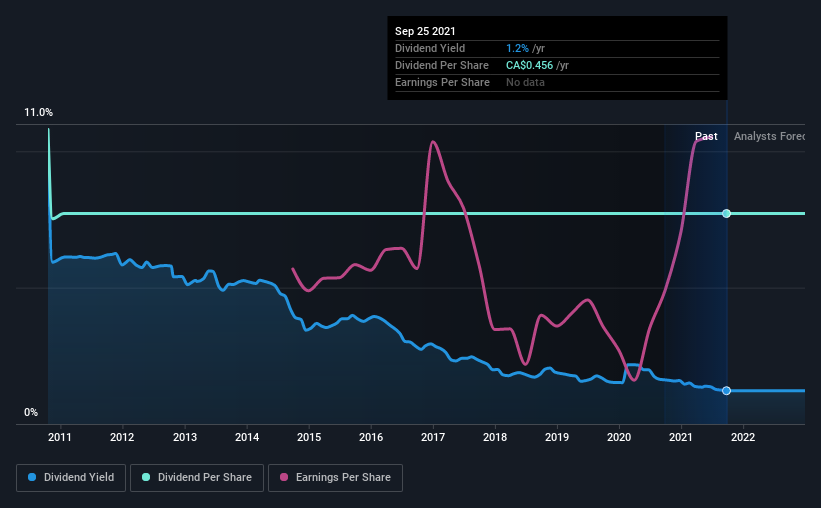Park Lawn Corporation (TSE:PLC) Looks Like A Good Stock, And It's Going Ex-Dividend Soon
Park Lawn Corporation (TSE:PLC) is about to trade ex-dividend in the next day or so. The ex-dividend date is usually set to be one business day before the record date which is the cut-off date on which you must be present on the company's books as a shareholder in order to receive the dividend. It is important to be aware of the ex-dividend date because any trade on the stock needs to have been settled on or before the record date. Accordingly, Park Lawn investors that purchase the stock on or after the 28th of September will not receive the dividend, which will be paid on the 14th of October.
The company's next dividend payment will be CA$0.038 per share. Last year, in total, the company distributed CA$0.46 to shareholders. Based on the last year's worth of payments, Park Lawn stock has a trailing yield of around 1.2% on the current share price of CA$37.36. We love seeing companies pay a dividend, but it's also important to be sure that laying the golden eggs isn't going to kill our golden goose! As a result, readers should always check whether Park Lawn has been able to grow its dividends, or if the dividend might be cut.
View our latest analysis for Park Lawn
Dividends are usually paid out of company profits, so if a company pays out more than it earned then its dividend is usually at greater risk of being cut. Fortunately Park Lawn's payout ratio is modest, at just 48% of profit. Yet cash flows are even more important than profits for assessing a dividend, so we need to see if the company generated enough cash to pay its distribution. Fortunately, it paid out only 26% of its free cash flow in the past year.
It's positive to see that Park Lawn's dividend is covered by both profits and cash flow, since this is generally a sign that the dividend is sustainable, and a lower payout ratio usually suggests a greater margin of safety before the dividend gets cut.
Click here to see the company's payout ratio, plus analyst estimates of its future dividends.
Have Earnings And Dividends Been Growing?
Companies with consistently growing earnings per share generally make the best dividend stocks, as they usually find it easier to grow dividends per share. If earnings decline and the company is forced to cut its dividend, investors could watch the value of their investment go up in smoke. For this reason, we're glad to see Park Lawn's earnings per share have risen 10% per annum over the last five years. The company has managed to grow earnings at a rapid rate, while reinvesting most of the profits within the business. Fast-growing businesses that are reinvesting heavily are enticing from a dividend perspective, especially since they can often increase the payout ratio later.
Another key way to measure a company's dividend prospects is by measuring its historical rate of dividend growth. Park Lawn has seen its dividend decline 3.3% per annum on average over the past 10 years, which is not great to see. Park Lawn is a rare case where dividends have been decreasing at the same time as earnings per share have been improving. It's unusual to see, and could point to unstable conditions in the core business, or more rarely an intensified focus on reinvesting profits.
Final Takeaway
Is Park Lawn worth buying for its dividend? Park Lawn has been growing earnings at a rapid rate, and has a conservatively low payout ratio, implying that it is reinvesting heavily in its business; a sterling combination. Overall we think this is an attractive combination and worthy of further research.
In light of that, while Park Lawn has an appealing dividend, it's worth knowing the risks involved with this stock. To help with this, we've discovered 2 warning signs for Park Lawn that you should be aware of before investing in their shares.
If you're in the market for dividend stocks, we recommend checking our list of top dividend stocks with a greater than 2% yield and an upcoming dividend.
This article by Simply Wall St is general in nature. We provide commentary based on historical data and analyst forecasts only using an unbiased methodology and our articles are not intended to be financial advice. It does not constitute a recommendation to buy or sell any stock, and does not take account of your objectives, or your financial situation. We aim to bring you long-term focused analysis driven by fundamental data. Note that our analysis may not factor in the latest price-sensitive company announcements or qualitative material. Simply Wall St has no position in any stocks mentioned.
Have feedback on this article? Concerned about the content? Get in touch with us directly. Alternatively, email editorial-team (at) simplywallst.com.


